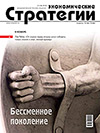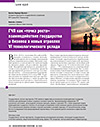Public-Private Partnership as a “Point of Growth” of Interaction Between the State and Business in New Industries of the VI Technological Order
Public-private partnership (PPP) is an effective mechanism of interaction between government and business for realization of complex and socially significant projects. The analysis of statistical sources made it possible to draw conclusions about the positive impact of investment in major infrastructure projects on GDP growth in both developing and developed countries. Having analyzed the definitions of PPP from different sources, author has identified the main principles, forms and characteristics of PPP, and suggested his own model of interaction between government and business. In present study special attention is paid to consideration of PPP contribution to the strategic development of key sectors of the economy in the context of transition to the sixth technological order. As a result of the study, perspective points of development of this mechanism in the sphere of high technologies have been formulated.
References:
- Glaz’ev S.Yu. Gosudarstvo — biznes v sovremennoy Rossii [The State — Business in Modern Russia]. Gosudarstvennoe upravlenie. Elektronnyy vestnik, 2003, no 2 (October), pp. 1–5, available at: http://e-journal.spa.msu.ru/uploads/vestnik/2003/vipusk_2._oktjabr_2003_g./glaziev.pdf.
- Kupryashin G.L. Instituty upravleniya institutami [Institutes of Institution Management]: Materialy kruglogo stola “Upravlenie razvitiem natsional’noy ekonomiki na federal’nom urovne” Otkrytogo nauchnogo seminara kafedry teorii i metodologii gosudarstvennogo i munitsipal’nogo upravleniya pod rukovodstvom akademika S.Yu. Glaz’eva [Materials of the round table “Managing Development of the National Economy at the Federal Level” of the Open Science Seminar at the Department of Theory and Methodology of State and Municipal Management led by academician S.Y. Glazyev]. Moscow, MGU imeni M.V. Lomonosova, 2016, October, 26. Gosudarstvennoe upravlenie. Elektronnyy vestnik, 2014, no 60 (February), pp. 12–18, available at: http://e-journal.spa.msu.ru/uploads/vestnik/2017/vipusk__60._fevral_2017_g./otkritii_nautchnii_seminar_kafedri_teorii_i_metodologii_gosudarstvennogo_i_munizipalnogo_upravlenija_pod_rukovodstvom_akademika_s.ju._glazeva/round_table.pdf.
- Pastukhanov A.E. Snizhenie riskov volatil’nosti razvitiya putem uchastiya gosudarstva v obshchestvenno znachimykh proektakh: istoricheskiy aspect [Reducing the Risks of Development Volatility Through State Participation in Socially Significant Projects: Historical Aspect]. Gosudarstvennoe upravlenie. Elektronnyy vestnik, 2017, no 62, pp. 71–86, available at: http://e-journal.spa.msu.ru/vestnik/item/62_2017pastukhanov.htm.
- Razvitie gosudarstvenno-chastnogo partnerstva v Rossii v 2015–2016 godakh. Reyting regionov po urovnyu razvitiya GChP [Development of Public-Private Partnership in Russia in 2015–2016. Rating of Regions by the Level of PPP Development]. Moscow, Assotsiatsiya “Tsentr razvitiya GChP”, 2016.
- Gosudarstvenno-chastnoe partnerstvo v Rossii 2016–2017: tekushchee sostoyanie i trendy, reyting regionov [Public-Private Partnership in Russia 2016-2017: Current Status and Trends, Ranking of Regions]. Assotsiatsiya “Tsentr razvitiya GChP”. Moscow, Assotsiatsiya “Tsentr razvitiya GChP”, 2017.
- World Bank, available at: http://ppi.worldbank.org/resources/ppi_methodology.
- Deryabina M.A. GChP: teoriya i praktika [PPP: Theory and Practice]. Voprosy ekonomiki, 2008, no 8.
- Vilisov M.V. Gosudarstvenno-chastnoe partnerstvo: politiko-pravovoy aspect [Public-Private Partnership: Political and Legal Aspect]. Vlast’, 2006, no 7.
- Kabashkin V.A., Levchenko A.A., Sidorov V.A. Razvitie gosudarstvenno-chastnogo partnerstva v regionakh Rossii [Development of Public-Private Partnership in the Regions of Russia]. Belgorod, IPTs “Politerra”, 2008.
- Ofitsial’nyy sayt Rossiyskoy Federatsii dlya razmeshcheniya informatsii o provedenii torgov, available at: https://torgi.gov.ru/stats.html.
- Kupryashin G.L. Modernizatsiya gosudarstvennogo upravleniya: instituty i interesy [Modernization of Public Administration: Institutions and Interests]. Moscow, Izd-vo Moskovskogo universiteta, 2011. 312 s.
- Kukleva N.Yu. Rol’ GChP v strategicheskom antikrizisnom upravlenii [The Role of PPPs in Strategic Crisis Management]. V sb. materialov IX Mezhdunarodnoy nauchno-prakticheskoy konferentsii “Gosudarstvo i biznes. Sovremennye problemy ekonomiki” [Materials of the IX International scientific-practical conference “The State and Business. Modern Problems of the Economy”]. Saint Petersburg, Severo-Zapadnyy institut upravleniya RANKhiGS pri Prezidente RF, 2017, April, 19–21. Saint Petersburg, Informatsionnyy izdatel’skiy uchebno-nauchnyy tsentr “Strategiya budushchego”, 2017, pp. 180–182.
- Ivanov V.V. Strategiya nauchno-tekhnologicheskogo razvitiya Rossii [Strategy for Scientific and Technological Development of Russia]. Moscow, RAN. Informatsionno-analiticheskiy tsentr “Nauka”, 2015.
- Glaz’ev S.Yu. Krizis, antikrizisnye mery i strategiya innovatsionnogo narodno-khozyaystvennogo razvitiya v zerkale teorii dolgosrochnoy megatekhnologicheskoy dinamiki [Crisis, Anti-Crisis Measures and the Strategy of Innovative National Economic Development in the Mirror of Theory of Long-Term Mega-Technological Dynamics]. Rossiyskiy ekonomicheskiy zhurnal, 2008, no 2, pp. 3–18.
- Glaz’ev S.Yu. Strategiya operezhayushchego razvitiya Rossii v usloviyakh global’nogo krizisa [Strategy of Russia’s Advanced Development in the Context of Global Crisis]. Moscow, Ekonomika, 2010.
- Glaz’ev S.Yu. O neotlozhnykh merakh po ukrepleniyu ekonomicheskoy bezopasnosti Rossii i vykhodu rossiyskoy ekonomiki na traektoriyu operezhayushchego razvitiya [On Urgent Measures for Strengthening Russia’s Economic Security and Shifting the Russian Economy onto the Advanced Development Trajectory]. Doklad. Moscow, Institut ekonomicheskikh strategiy, Russkiy biograficheskiy institut, 2015, 60 p.
- Raynert E.S. Kak bogatye strany stali bogatymi, i pochemu bednye strany ostayutsya bednymi [How Rich Countries Became Rich, and Why Poor Countries Remain Poor]. Per. s angl. N. Avtonomovoy; pod red. V. Avtonomova. Moscow, Izd. dom Gos. un-ta — Vysshey shkoly ekonomiki, 2011, 384 p.
- Kukleva N.Yu. Gosudarstvenno-chastnoe partnerstvo v strategicheskom gosudarstvennom upravlenii v usloviyakh krizisa [Public-Private Partnership in Strategic State Management in Times of crisis]. V sb. materialov VI Mezhdunarodnoy nauchno-prakticheskoy konferentsii “Strategicheskoe antikrizisnoe upravlenie: global’nye vyzovy i rol’ gosudarstva” [Materials of the VI International scientific-practical conference “Strategic Crisis Management: Global Challenges and the Role of the State”]. Moscow, Pero, 2016, pp. 74–82.
- Skizhenok P.V. Rol’ gosudarstvenno-chastnogo partnerstva v strategicheskom planirovanii ekonomiki Rossii v usloviyakh ekonomicheskogo krizisa [Role of Public-Private Partnership in Strategic Planning of the Russian Economy in the Economic Crisis Context]. V sb. materialov nauchno-prakticheskoy konferentsii “Opyt i napravleniya razvitiya gosudarstvennogo i munitsipal’nogo upravleniya” [Materials of the scientific-practical conference “Experience and Development Areas of State and Municipal Management”]. Moscow, KDU, Universitetskaya kniga, 2016, 318 p.
- L’vov D.S. Missiya Rossii [Mission of Russia]. Sb. nauchnykh trudov. Pod nauch. red. S.Yu. Glaz’eva i B.A. Erznkyana. Moscow, Gos. un-t upravleniya, 2002, 120 p.



